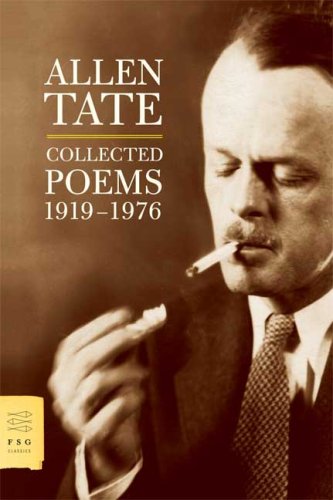All Nonfiction
- Bullying
- Books
- Academic
- Author Interviews
- Celebrity interviews
- College Articles
- College Essays
- Educator of the Year
- Heroes
- Interviews
- Memoir
- Personal Experience
- Sports
- Travel & Culture
All Opinions
- Bullying
- Current Events / Politics
- Discrimination
- Drugs / Alcohol / Smoking
- Entertainment / Celebrities
- Environment
- Love / Relationships
- Movies / Music / TV
- Pop Culture / Trends
- School / College
- Social Issues / Civics
- Spirituality / Religion
- Sports / Hobbies
All Hot Topics
- Bullying
- Community Service
- Environment
- Health
- Letters to the Editor
- Pride & Prejudice
- What Matters
- Back
Summer Guide
- Program Links
- Program Reviews
- Back
College Guide
- College Links
- College Reviews
- College Essays
- College Articles
- Back
Collected Poems, 1919-1976 by Allen Tate (2007)
When Farrar, Straus, and Giroux decided to reprint Allen Tate's “Collected Poems 1919-1976,” some have wondered if there is still an audience out there who would appreciate his metaphysical poems. Even his greatest masterpieces, “Ode to the Confederate Dead” and “The Mediterranean,” have not been included in the Norton Anthology canon. Nowadays, a dead white man (who once fostered pro-segregation views) could barely make a splatter—or can he?
Politics aside, Allen Tate's poems still resonate with elegance and power. The precise of his traditional meter cuts through the page like a sharp barrow knife. At the same time, his peculiar diction and Modernist imagery makes the reader ponder at the deep meaning behind each poem. If deciphering the meaning of his poems proves to be a challenge, deciphering the content and context of his works can be equally daunting.
An erudite scholar, Tate adored allusions (like his hero T.S. Eliot), particularly obscure Roman poetry and Southern history. His diptych poems “Aeneas at Washington” and “Aeneas at New York” are so densely packed with Agrarian economic theory, reflections on the Civil War, and mythological references that the uncommitted reader might give up entirely.
Then again, Tate has his moments of brilliance; in “The Subway,” he depicts the fast-paced movement of Manhattan like an abstract painter: “Till broken in the shift of quiet / Dense altitudes tangential of your steel, / I am become geometries.” His word choice captures the energy of the moment, at the same time, delineating the cold, inorganic nature of urban life.
One great addition to this edition of Tate's “Collected Poem” is a section of his translations. While his translations of Baudelaire and Sappho are emotional and poetic, his version of “The Vigil of Venus” outshines all previous translations. Fully embracing the sensual language of the original poem (unlike his Victorian counterparts), Tate unabashedly elevates pagan love and sexuality to a divine level.
Allen Tate's “Collected Poems 1919-1976” is not for the average reader interested in sipping light verse on a summer day. No, Tate's poetry is unadulterated Tennessee whiskey—-and it will hit you like a wall of bricks.
Similar Articles
JOIN THE DISCUSSION
This article has 0 comments.

